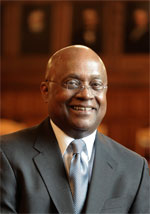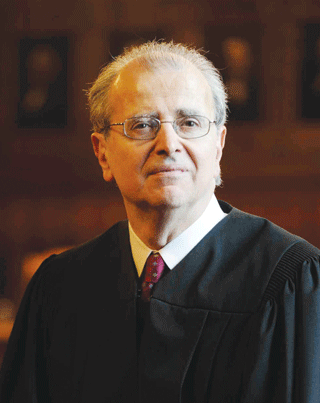New York Court of Appeals Judge Theodore Jones died suddenly last night of an apparent heart attack. He was just 68. Judge Jones ascended to New York’s high court by way of the Brooklyn courts, where he was highly regarded for his respect for both the law and lawyers.
That respect is reflected in the following introduction of Judge Jones delivered a few years ago by Evan Goldberg when the New York State Bar Association gave him an award. The remarks are reprinted here with the permission of Goldberg.
————————————-
Our speaker this evening is well known to us all. Judge Theodore Jones has long been a friend of the trial bar, after years of being a trial lawyer himself. He started in the Legal Aid Society, then went to private practice and began his career as a judge in the Juvenile Offender part of Kings County. All this helped shape his judicial character, as a jurist who honestly wants to help people.
His rapid elevation, from Supreme Court, to Administrative Judge, to the Court of Appeals is a testament to the high regard his colleagues have for him. And his TV persona, exhibited during the infamous 2005 transit strike let other people in on what was, at that time, Brooklyn’s best kept secret; that when Judge Teddy Jones got onto a case, an equitable resolution was soon to follow.
When the trial bar lost Judge Jones to the Court of Appeals, we all grieved, because we need judges like him for our trials, but we took collective solace in the knowledge that he would be safeguarding the rule of law in a Court deserving of his inspired participation. Whether he’s penning a scholarly opinion or driving for the green on the golf course, he always devotes his impressive skill with full effort, skill and passion.
For me, personally, Judge Jones has always been available to lend his ear and offer advice. His inclusive, fathering approach is innate. He regularly attends the lawyer golf outings and he’s so good. How good is he? He’s so good, we don’t even have to pretend to lose. Um, not that we do that. Judge Jones is also quite the marksman, a skill he undoubtedly honed when he was a Brooklyn Court Street lawyer. His service as a captain in Viet Nam may also have helped.
Just two days ago, our association’s Diversity Committee gave Judge Jones a lifetime achievement award for his longstanding efforts to advance minorities in our profession. Whether he’s working with high school students, seasoned veterans, or anything in between, Judge Jones is everyone’s BFF. I was truly honored on behalf of our association, when Judge Jones agreed to be our speaker. Ladies and gentlemen, I present Associate Judge of the NYS Court of Appeals, the Honorable Theodore T. Jones, Jr.
———————–
Update: From the New York Law Journal, a sampling of opinions from Judge Jones.


